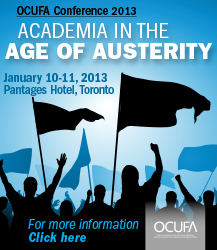Last night, Dalton McGuinty resigned as premier and prorogued the Ontario Legislature. This means that all legislative business has ceased and all legislation currently being considered dies on the order paper. When a new session of the Legislature is eventually convened, it will be a new session of parliament, accompanied by a Throne Speech. All legislation that was previously being considered will have to be re-introduced, alongside any new legislation the government wishes to propose.
We do not know when the Legislature will meet again. The Liberals will be preoccupied with a leadership convention, and likely do not want the legislature to be in session while they select a new leader. A prorogued legislature will give the Liberals time to elect a new leader, present itself as a “new and refreshed” party, present a campaign-focused budget, and gear up for an election — which could very well take place in the Spring.
In his resignation speech, the Premier also said that during the period that the legislature is prorogued, the government would like to discuss a negotiated wage freeze with its labour “partners”, and failing that, bring in wage freeze legislation with the cooperation of at least one opposition party. As he put it: “two tasks lay ahead — first to negotiate wage freezes with public sectors unions; second, to work with the opposition to form a legislated plan that can pass the minority government. When the House returns we’re going to either have negotiated agreements in hand or a legislative plan supported by the opposition.”
At this point, we do not know what this means for the government’s proposed anti-labour legislation.The draft bill was not introduced in the legislature, and could change significantly or be dropped altogether. As Premier McGuinty noted, wage restraint continues to be a priority for the government and it is likely that a new leader will still pursue some form of wage restraint (either legislated or negotiated). Any legislation will have to wait until the legislature sits again, which could be as long as six months from now. We also do not know where this leaves the government’s post-secondary education reform agenda, or its work to change public sector pensions. Again, it is likely that both initiatives will remain a priority for the government, though how this will manifest in public policy is unclear.
We will be seeking more information from our contacts in government, opposition parties and the bureaucracy on how these government initiatives may develop in the coming months. This legislative “pause” also gives OCUFA an opportunity to plan targeted interventions (with leadership candidates, influential MPPs, and sympathetic opposition parties), a longer period to educated and mobilize our own members, and more time to strengthen our connection and coordination with other public sector unions in order to push back against destructive anti-labour legislation, unwelcome pension changes, and unwise university reforms.
We will keep you informed as more information comes available.








